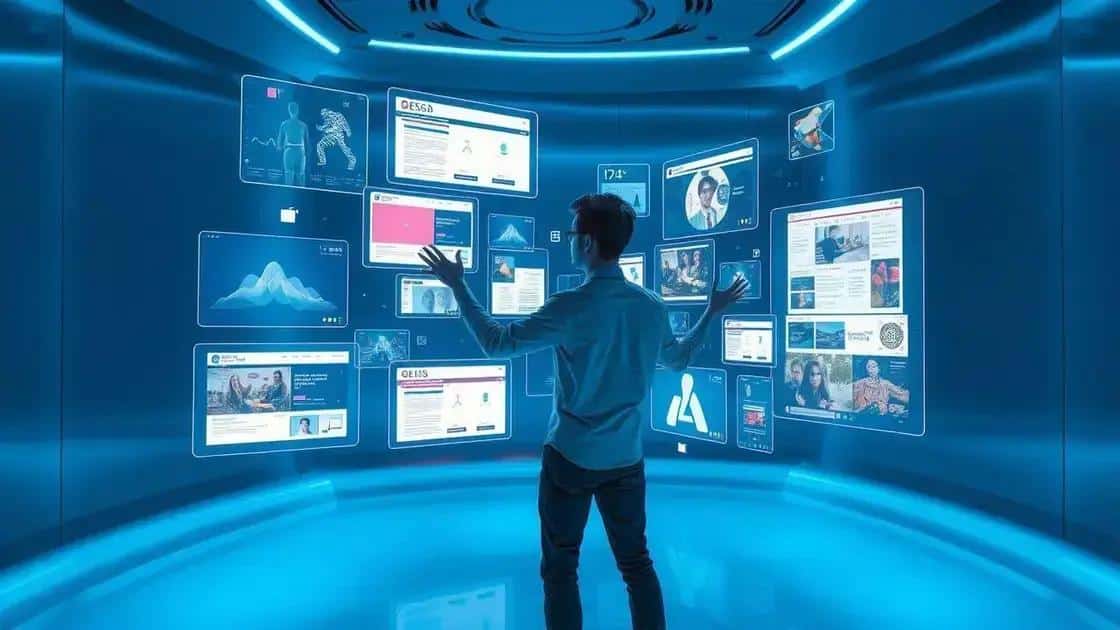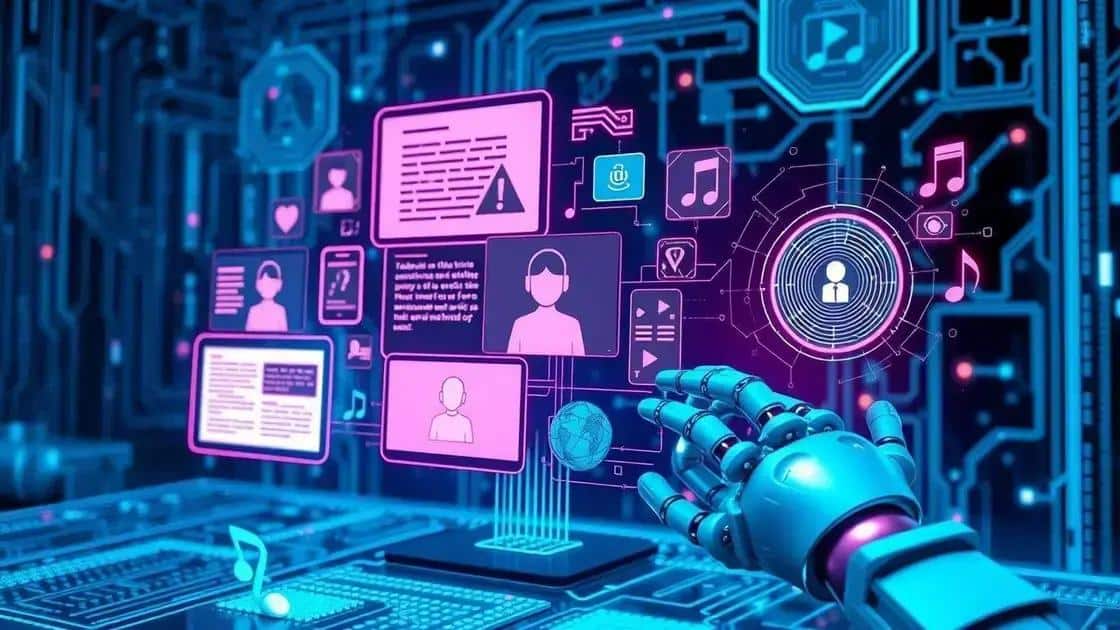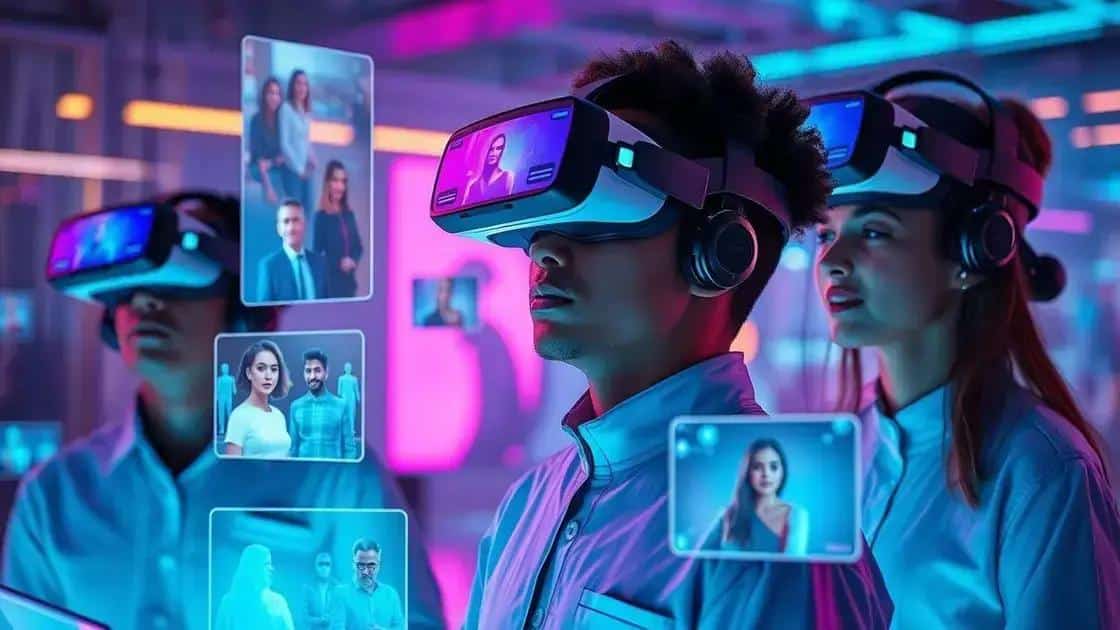Insights on ai-generated media trends that you need to know

AI-generated media trends indicate that artificial intelligence enhances personalization, improves content creation speed, and raises ethical considerations, shaping the future of how we consume and interact with digital content.
Insights on ai-generated media trends showcase the evolving landscape of digital content. Have you noticed how AI is reshaping creativity? Let’s dive into how these trends could influence your media consumption.
Understanding ai-generated media
Understanding ai-generated media is becoming increasingly important as technology evolves. Today, AI plays a crucial role in creating the content we consume daily.
Artificial intelligence can generate text, images, videos, and music. This transformation is reshaping the media landscape right before our eyes. Let’s explore how this works and why it matters.
What is ai-generated media?
Ai-generated media refers to content created by algorithms rather than human hands. These algorithms analyze vast amounts of data and learn patterns to produce new, original content.
Benefits of utilizing ai in media
- Enhances creativity by offering new ideas.
- Saves time in the content creation process.
- Provides personalized content for users.
- Increases consistency in media output.
The creation process involves several stages, including data gathering, training, and content generation. AI can create anything from articles to illustrations, which can engage audiences in unique ways. For instance, news articles can be generated in seconds, keeping readers informed in real time.
Challenges of ai-generated media
Despite its advantages, ai-generated media also faces challenges. The key issues include ethical considerations and originality. Questions arise about the authenticity of AI-generated content and how it affects copyright laws.
Moreover, AI lacks the human touch that often makes media relatable. While AI can mimic styles, it may struggle to capture the emotional nuances that human creators infuse into their work.
As AI technology continues to improve, it’s essential for creators to find a balance between using AI for efficiency and maintaining the personal connection that audiences crave. The future of ai-generated media looks promising, yet experts must address the challenges to harness its full potential effectively.
Current trends in ai-generated content

Current trends in ai-generated content reveal a fascinating evolution in how content is created. As technology advances, we see new methods and tools emerging that shape the way information is produced.
One significant trend is the rise of automated storytelling. AI systems are now capable of generating articles, stories, and reports based on data inputs. This means businesses and content creators can produce more material in less time.
Personalization of content
Another vital trend is the personalization of ai-generated content. AI analyzes user behavior, preferences, and demographics to create tailored experiences. This means that users receive content that resonates with their interests, enhancing engagement.
- Customized news articles based on reading habits.
- Targeted marketing messages that align with customer preferences.
- Interactive media experiences that adapt in real-time.
The increasing use of natural language processing (NLP) is also noteworthy. NLP allows AI to understand and produce human-like text more effectively. This capability results in more relatable and coherent content that captures the audience’s attention.
Video and multimedia content
In addition to text, AI’s role in creating video and multimedia content is growing. AI can generate videos from scripts or concepts, making it easier to produce quality visual content without extensive resources.
Likewise, music creation using AI is becoming mainstream. AI tools are now capable of composing original tracks based on styles and genres. This innovation opens new doors for artists and content creators, letting them explore unique sounds and compositions.
As we move forward, it’s essential to consider how these trends will continue to evolve. Striking the right balance between human creativity and AI precision will define the future of media and content production.
Impacts of ai on media consumption
Impacts of ai on media consumption are reshaping how we engage with information and entertainment. As artificial intelligence becomes more integrated into our daily lives, it changes not only what content we see but how we interact with it.
One major impact is the personalization of media. AI algorithms analyze user behavior to deliver customized content. This means that what one person sees may differ vastly from another’s experience. For instance, streaming services use AI to suggest shows and movies based on viewing history, enhancing user satisfaction.
Enhanced user engagement
The incorporation of AI leads to higher engagement rates. When content aligns with user preferences, individuals are more likely to spend time interacting with it. Factors driving this engagement include:
- Recommendations tailored to viewing habits.
- Interactive content that resonates with user interests.
- Real-time feedback and adjustments to content delivery.
This kind of algorithm-driven content consumption keeps users returning for more, creating a cycle of engagement that benefits both consumers and creators. Another impact of AI is the ability to produce content at scale. News articles, videos, and posts are generated faster than ever, making information readily available. However, this speed can come at a cost, sometimes leading to concerns over quality and accuracy.
Changing attention spans
The quick access to content can also alter attention spans. With overwhelming amounts of information available, users might switch from one piece of media to another rapidly. This shift challenges content creators to capture attention quickly and maintain interest. To cope, storytelling techniques have evolved. Creators now aim to deliver impactful content in shorter formats, such as social media clips or bite-sized articles.
As AI continues to evolve, its effects on media consumption will grow. Examining how audiences respond to personalized experiences and rapid content generation can help media professionals adapt their strategies. Embracing these changes can lead to exciting new media landscapes where user engagement is at the forefront.
Future predictions for ai in media

Future predictions for ai in media suggest that we are just at the beginning of an exciting transformation. As technology develops, we can expect AI to play an even larger role in content creation and distribution.
One prediction is the rise of hyper-personalized content. AI will analyze user preferences, not just based on past interactions but also real-time behavior. This will lead to content recommendations that feel intuitive, almost as if they can read the user’s mind.
Integration of virtual and augmented reality
Another prediction is the deeper integration of AI with virtual reality (VR) and augmented reality (AR). These technologies will create immersive media experiences that are not only interactive but also tailored to individual users. Imagine walking through a virtual museum where each piece of art is explained by an AI guide just for you.
- Enhanced storytelling that combines AR and AI.
- AI-powered avatars in virtual interactions.
- Personalized VR experiences in entertainment and education.
Moreover, we may see significant advancements in AI’s ability to create complex narratives. Instead of simple content generation, AI could eventually build intricate storylines based on user feedback and choices, leading to unique narratives for each viewer.
Ethical considerations
As AI’s capabilities grow, ethical considerations will also become more prominent. Issues such as data privacy and the authenticity of AI-generated content will gain attention. Media companies will need to address these concerns to maintain trust with their audiences.
Additionally, there will likely be discussions on the role of AI in media bias. Developers must ensure that the data used to train AI systems is diverse and unbiased, allowing for fair representation of all voices in media.
Ultimately, the future of AI in media is full of potential. By embracing innovation while staying mindful of ethical considerations, we can look forward to a dynamic media landscape that enhances our consumption experience.
FAQ – Frequently Asked Questions about AI in Media
What is AI-generated content?
AI-generated content is content created using algorithms that analyze data to produce original material, such as articles, videos, and music.
How is AI impacting personalization in media?
AI enhances personalization by analyzing user behavior, allowing platforms to deliver tailored content that matches individual preferences.
What are the ethical concerns of AI in media?
Ethical concerns include data privacy, authenticity of content, and potential biases in AI algorithms that may affect representation.
Will AI replace human creators in media?
AI is more likely to assist human creators rather than replace them, providing tools that enhance creativity and efficiency in content production.





